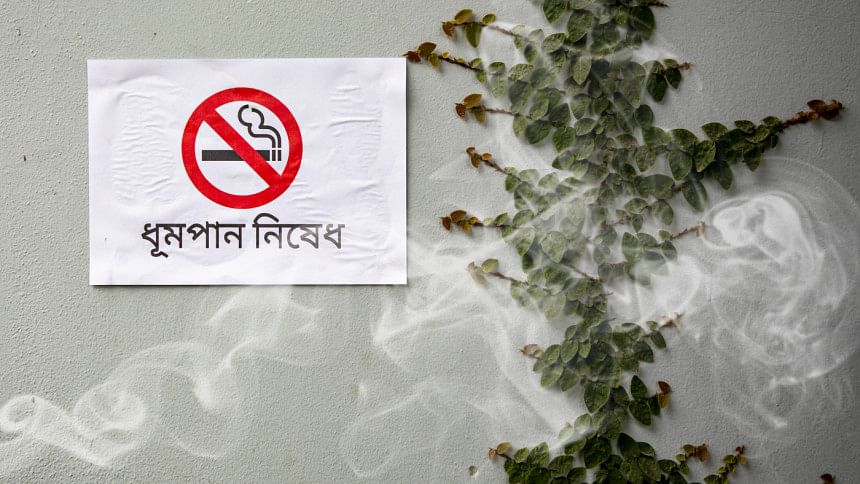Is enough being done to curb smoking?

The act of smoking is one that is far too often misinterpreted as a soother of sadness, when it really is a deadly companion. From every possible perspective, it is the arch-enemy of the human body. Nonetheless, there are people who are aware of this and still smoke frequently, even from an alarmingly young age.
Personally, from an early age, I had faith that everyone in my class would internalise the lessons taught about smoking and never engage in it. Starting from textbooks listing the harms of smoking to raising general awareness, I assumed Bangladesh had already done enough to stop smoking for the new generation.
But now I think to myself: what went wrong? The faith I possessed was naively built on fragile foundations, and encountering more and more students who indulged in smoking only solidified that misconception. Some of my friends, who swore to stay clean, would soon become additions to this club of regular smokers.
All of this begs the question, is enough really being done against smoking in our country?
In search of an answer, it became clear that some issues and stigmas around smoking aren't discussed often. It's widely accepted that many smokers in Bangladesh are victims of so-called "bad company". But people usually forget to consider that many people start smoking to escape from pain, depression, and trauma. They were rendered helpless, and in their vulnerability, cigarettes and tobacco products were readily accessible.
Imagine if your own schooling institution has tobacco sellers disguised as tea stalls in close proximity. Imagine being persuaded to smoke by your peers and seniors who did so as a coping strategy during difficult times. Institutions even show poor records of dealing with student smokers, failing to give them proper counselling and rehabilitation.
Culturally, smoking is oftentimes associated with manliness, being a femme fatale, or rebellion. There are fictional smokers who may be romanticised or portrayed in a favourable light in the pop culture landscape. Additionally, despite not being chain-smokers, many influencers advocate for a hazard that traps others into developing a nicotine addiction.
But saying all of this as if Bangladeshi authorities haven't made any attempts to combat smoking would be disrespectful to the hard workers who truly want to combat the issue.
With acts like "The Smoking and Using of Tobacco Products (Control) Act, 2005" and "The Juvenile Smoking Act, 1919", Bangladesh has successfully reduced smoking from a reported 34 percent to 20 percent within the span of 13 years (2000-2013). Nevertheless, how strictly these laws are being implemented is still questionable, as statistics show roughly 4 in 10 of student smokers starting before the age of 10.
There aren't any concrete parameters for what can be considered "enough" against smoking in our country. However, we can do better against it. Whether it's through ensuring the strictness of authorities on the matter or simply providing a close friend with proper guidance and support, there are things we can do against smoking that can help to make a difference.
References:
1. Tobacconomics.org (2022). Bangladesh: Raising Tobacco Taxes in FY 2022-2023
2. National Library of Medicine (2006). Prevalence of tobacco use and its contributing factors among adolescents in Bangladesh: Results from a population-based study
Shaikh Sabik Kamal is (metaphorically) lost. See if you can direct him home through [email protected]

 For all latest news, follow The Daily Star's Google News channel.
For all latest news, follow The Daily Star's Google News channel. 








Comments